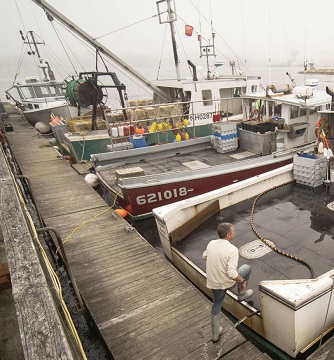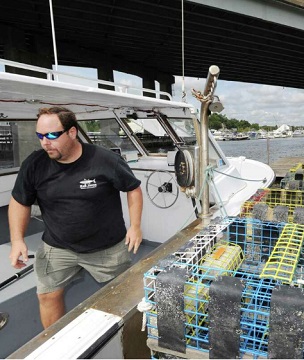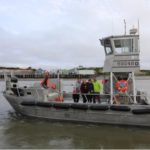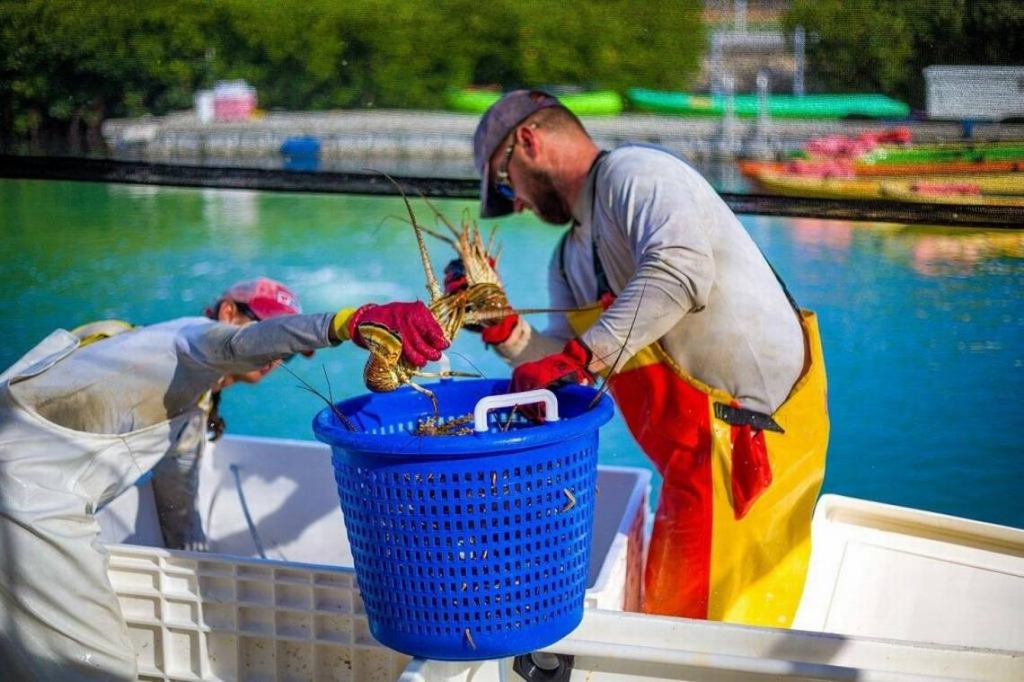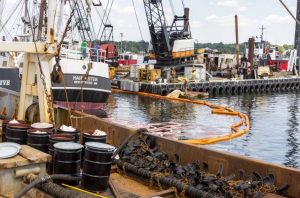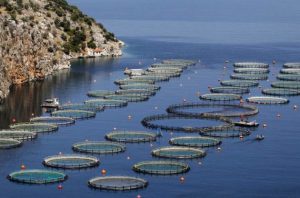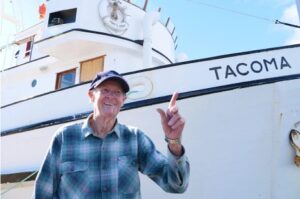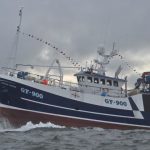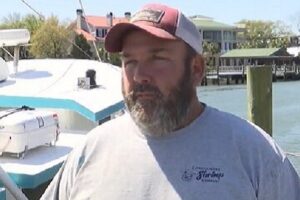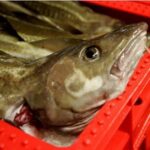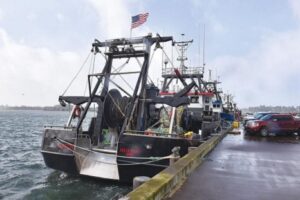Author Archives: borehead - Moderator

Brexiteer highlights four things Rishi can do to save Britain’s battered fishing industry
Britain’s long-suffering fishermen still need to be shown the benefits to quitting the European Union, Tory MP Sir John Redwood has said, seven years after the nation voted for Brexit. And the long-term Eurosceptic has pinpointed four things Rishi Sunak’s Government can do to demonstrate the decision was the right one. Many fishermen backed Brexit from the beginning, spearheaded by the Fishing for Leave campaign, which saw it as an integral way to seize back control of the seas around Britain. However, many were left bitterly disappointed by the end result, believing the deal signed by then-Prime Minister Boris Johnson have given too much away to Brussels. Video, >click to read< 13:34
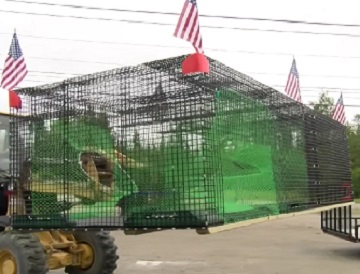
Columbia Falls company say they have made the world’s largest lobster trap
The crew at the Friendship Trap Company on the side of Highway 1 in Columbia Falls have made what they say is the world’s largest lobster trap. “We just thought it would be neat something for people to stop and take pictures with and just to say we have the world’s largest lobster trap,” said Branch Manager Jim Emerson. He worked on the trap for nearly three days with members of their team and his son Brady. “I helped a little bit with passing parts but I’m not allowed to use the air tools and I did a little bit of spray painting,” said Brady Emerson. They usually build standard traps but wanted to try to break records with this one. Video, >click to read< 11:45
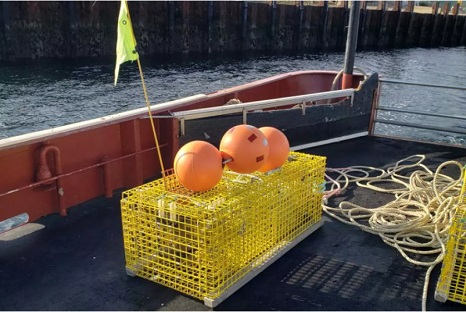
NOAA wants to expand ‘ropeless’ fishing gear pilot to include some Maine lobstermen
Last winter as part of a pilot project, some Massachusetts lobstermen were allowed to fish in areas that are seasonally closed to protect endangered North Atlantic right whales. But they had to use so-called “on-demand” or “ropeless” fishing gear and work with the National Oceanic and Atmospheric Administration to share their feedback. Now NOAA wants to expand the program to include lobster and other fixed-gear fishermen throughout New England. Federal officials have proposed issuing permits to more than 200 people, with priority given to those who fish closed areas during the winter. More than 100 people in Maine fish those closed areas. And fishermen aren’t thrilled with the idea of opening access to only some of them, said Patrice McCarron of the Maine Lobstermen’s Association — unless there’s enough on-demand gear to go around to everyone. >click to read< 10:00
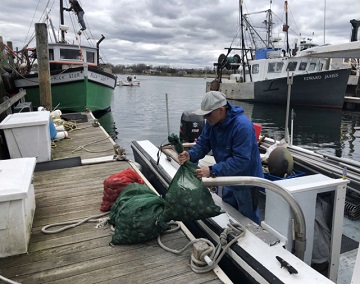
Rhode Island’s commercial fishing industry, by the numbers
The calamari comeback is going strong, while lobsters lag and flounders flounder. That’s according to a new Department of Environmental Management report on the fishing industry last year. In 2022, the overall value of commercial fishing landings in Rhode Island was $100.6 million. That’s about 10 percent lower than 2021 when you account for inflation. The drop is discouraging, but there’s a lot that plays into seafood landings annually, including biological, fisheries management, and economic factors, according to Conor McManus, chief of DEM’s Division of Marine Fisheries. The full DEM report also takes a look at recreational fishing, but for today, we’ll stick with a seafood sampler of data about the commercial fishing industry. >click to read< 08:23
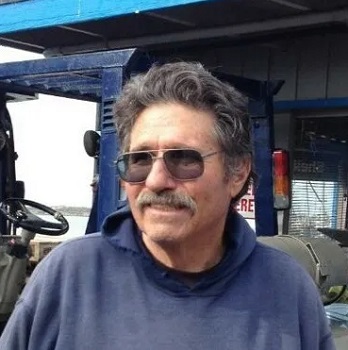
Commercial Fisherman Frederick Reno Italo Arnoldi of Morro Bay, has passed away
Frederick “Fred” Arnoldi, 72, of Morro Bay, California, left on his Eternal Hunting and Fishing Trip in the early morning hours of Tuesday, June 27, 2023. He is survived by his wife Diane Arnoldi; siblings Dennis Arnoldi and Janice Morgan; nieces, nephews, children, grandchildren, and great grandchildren. Fred was born and raised in Santa Barbara, where he attended Santa Barbara High School. He left Santa Barbara to become a commercial fisherman from 1968 until his last day on earth. He fished salmon in Alaska and the South Seas. Fred seined in San Pedro, and fished herring in San Francisco. Fred owned several vessels including Drifter, Halcyon, Roselena Marie, H2O K-9 and Amakua. >click to read< 21:29
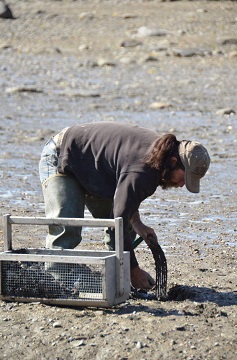
Harvesters at high risk for injury, but avoid doctors
Stooped over a 5-gallon bucket while wielding a clam rake in heavy, wet sand left by a receding tide? It’s hard work, but that’s where the clams are. The same holds true for hauling traps from the bottom of the ocean floor onto a lobster boat – if you want to sell lobsters. The Downeast Health Research Collaborative conducted a harvester health study led by Dr. Tora Johnson, a University of Machias professor who comes from a family of Downeast fishermen. The connection between injuries and pain and substance misuse is well known, but among fishery harvesters, the risk is high. “Chronic pain is the driver for most opioid use and misuse,” student Lauren Sachs said at the Northern Light Health symposium. To compound the issue, harvesters are self-employed and often are uninsured or underinsured for health care. >click to read< 18:39
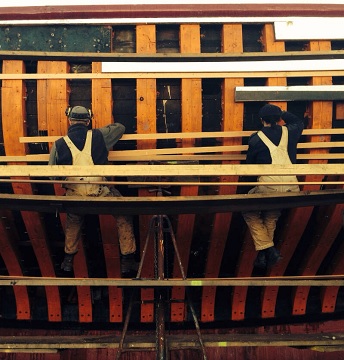
Port Townsend: Haven Boatworks expands their wake
The team of shipwrights at Haven work on all types of boats, from upkeep on commercial fishing boats to repairs on yachts and wooden sail boats. At any given time, they may have more than a dozen boats in the yard. They stay busy from mostly word-of-mouth referrals from delighted customers. Blaise Holly says that whether commercial or private, captains have a relationship with their vessels. For commercial owners a boat is their livelihood where they spend the bulk of their time. Every year or two most boats need some type of routine maintenance, like cleaning off buildup of seaweed and barnacles from the hull photos, >click to read< 15:01
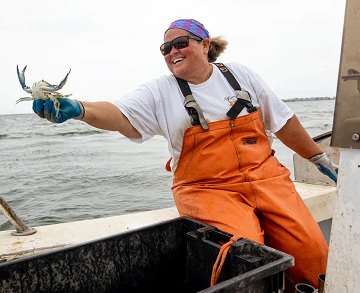
Making A Name In Outer Banks Seafood – Vicki Basnight is carrying on the family legacy, one catch at a time
When you pick up the specials list at the Lone Cedar Café in Nags Head, it’s hard to miss Vicki Basnight’s name. On a spring night during the short soft-shell crab season, her name is on it four times, not just as co-owner of the restaurant she opened 27 years ago with her parents, Marc and Sandy, but also as the crabber for the fried soft-shell crab bites appetizer, the fried soft-shell platter with French fries and coleslaw, the soft-shell crab and shrimp pasta, and the stuffed softshells filled with mounds of flaky white crabmeat. Truthfully, she gets a little embarrassed about it. But there are other names on the menu, too: Luke Midgett, who traded another fisherman for the rockfish, Boo Daniels and Joe Elms, who caught the tuna used in two different dishes. Photos, >click to read< 13:27
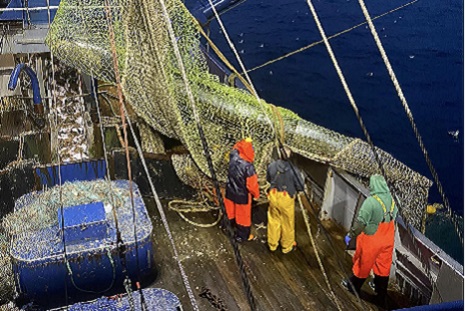
Fishermen Reel in 26-Foot-Long WWII Torpedo Inside Their Net
A fisherman landed an explosive catch while out trawling for fish along the sea bed in Denmark that was later revealed to be an undetonated World War II torpedo. Danish fisherman René Kloster alerted the country’s authorities after the torpedo became entangled in the net several miles off the west coast of the Jutland peninsula on Saturday, July 1. Kloster, captain of the fishing vessel St. Anthony, said that the torpedo was later detonated away from the coast. “It was huge. I have never seen such a big torpedo before. It is quite incomprehensible that such a big one comes up. You just have to catch your breath afterward.” Kloster said that this is the third time he has pulled up a torpedo. photos, >click to read< 09:47

Crew safety on Icelandic commercial fishing vessel reaches new high with additional of FLIR M364C thermal camera
With the FLIR M364 installed, the 72.5 metre Vikingur AK 100, can benefit from its high definition, low light camera, which boasts one of the most advanced FLIR thermal imaging cores, providing an elite level of awareness on the water. The addition of thermal cameras gives a sixth sense for work at close quarters and in poor visibility which can be typical in Iceland. “It really allows the captain and crew more situational awareness, particularly in case of MOB and icy conditions. The captain can easily see the crew on board in the dark and are able to spot dangers in advance or if one of the crew has entered the water. The increased visibility also enables us to see the floats and buoys during purse seining, and although we are yet to obtain hard data for increased fishing performance, it is without doubt making the crews lives easier, and crucially, safer.” Video, photos, >click to read< 08:31
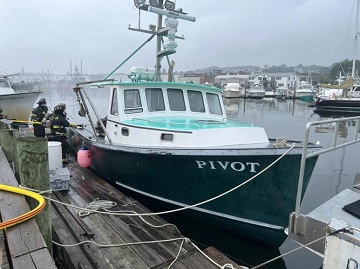
Gloucester: Fishing boat’s exhaust sets it afire
No one was injured but a fishing vessel was damaged when it caught on fire Sunday morning. At 9:27 a.m. on Sunday, July 2, the Gloucester Fire Department received a report of a boat fire at Captain Joe and Sons, 95 East Main St. Upon arrival, firefighters discovered smoke coming from the Pivot and attempted to gain access, however, another boat was obstructing firefighters from being able to, according to a statement from fire Chief Eric Smith. The owner of the other boat quickly arrived to move it, allowing for firefighters to board the Pivot. 2 photos, >click to read< 07:46
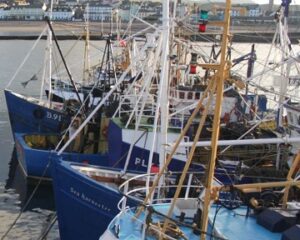
Brexit revives historic herring fishing after 25-year hiatus
The Isle of Man’s historic herring industry is being revived after a quarter of a century thanks to a post-Brexit deal with the UK over fishing quotas. The island’s fishermen will be able to land four times as many herring as before and will also be allowed to catch 235 tonnes of langoustines, worth a total of more than £2 million per year to the island’s economy. The Manx fishing industry was brought to its knees by the European Union Common Fisheries Policy, which placed strict limits on the size of catches in the 1980s. >click to read< 16:49
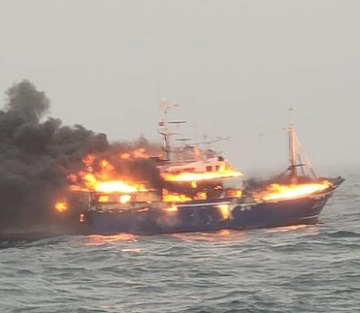
15-Man Crew of Galician Fishing Boat Rescued in British Waters After Fire Breaks Out
There were no reports of any injuries after the incident in the Gran Sol. The sailors from the F/V Nuevo San Juan fishing boat that is based in the Lugo town of Burela were rescued by another fishing vessel, the F/V Nuevo Confurco. As soon as the blaze broke out the 15 crew members abandoned the ship and took to the lifeboats. While they were rescued safe and sound, material possessions were regrettably lost in the incident. The longline trawler is 31.5 metres in length and specialises in fishing for hake. >click to read< 13:47
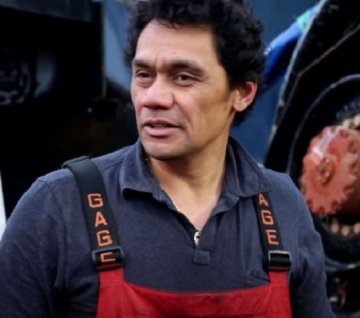
Toughest Cast Members From Deadliest Catch
It’s easy to fall into the trap of beginning to think that just because “Deadliest Catch” is on television, there’s no way that the producers or the network could possibly let anything happen, but here’s the thing: The Bering Sea doesn’t really care who’s watching, and one slip-up can mean the end of a life. Those who go out, do so prepared to face the worst. That said, not all crew members are made of the same stuff. There are some that have been forged in fire, come out the other side, and then gone on to spend months at a time in one of the most unforgiving landscapes in the modern world. That takes a kind of toughness that can’t be measured … and it’s one that’s not always about who can bench-press the most. >click to read< 11:02
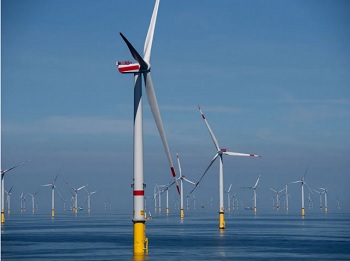
The dirty details of offshore wind’s ‘clean energy’
“In New Jersey, it’s go hard or go home,” Gov. Phil Murphy Tweeted after signing an executive order to up the state’s offshore wind goals by nearly 50% last September. Perhaps, the governor didn’t consider the fact that those in the state who question the perils and efficacy of offshore wind turbines are playing by the same saying. This “clean energy economy,” as conceived and fast-tracked by the Biden administration (and treated as the holy grail by Gov. Phil Murphy), has been shoved down the throats of those who live in shore communities, even though the risks to every aspect of marine life are poorly understood and little evidence exists that wind energy will make a noteworthy impact on climate change. By Linda Bonvie, >click to read< 09:53

Government shelving HPMAs a ‘cautious win’ for industry
There remains concern from Shetland Fishermen’s Association, however, that an alternative could be worked up by government which may end up being similar to HPMAs. SFA officer Sheila Keith said one fisherman told her after news of the U-turn that the government had only kicked HPMAs into the “long grass” for a while. On Thursday the Scottish Government announced that after consulting communities it would be dropping its proposal for HPMAs. Keith commented that the SFA welcomed the news, but said it was a case of wait and see regarding what the government’s alternative “pathway” will be. She said the government has “basically just bought themselves time”. >click to read< 08:59

New Bedford receives $99,290 grant to support commercial fishing industry, build climate resiliency
“The Healey-Driscoll Administration today announced $1.6 million in grants to support innovative approaches to enhance Massachusetts commercial marine fisheries and the seafood industry. Twenty Massachusetts businesses and organizations are receiving funding through the Environmental Economic Innovation and Resiliency in Marine Fisheries Grant Program, supplemented by the American Rescue Plan Act (ARPA). The grant program will fund projects that work to mitigate economic barriers resulting from climate change and promote sustainable, local fisheries development in Massachusetts. >click to read< 08:04
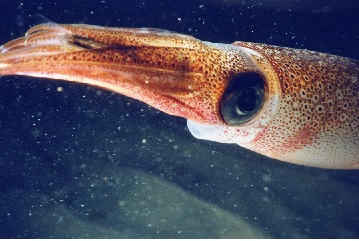
Cooler ocean means better business for squid fishermen off La Jolla
Though a cool and wet start to 2023 had many locals lamenting the weather, coastal fishermen and seafood lovers are celebrating an environmental perk: the proliferation of squid off La Jolla’s coast. “It’s a historical thing that happens,” said independent commercial fisherman John Law. He said the squid currently are abundant from the underwater canyons off Scripps Pier down to Crystal Pier in Pacific Beach and even into Baja California, Mexico. Catching squid is a “team effort,” said San Diego fisherman Kelly Fukushima. The squid feed at night, so catching them requires two boats: one to scout the squid and use lights to aggregate a school and a second to catch and haul in the squid. >click to read< 14:01
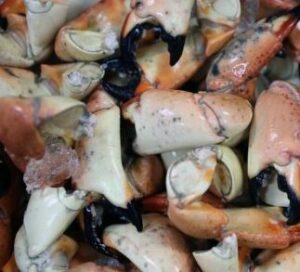
How Stone Crabs Built and Sustain Everglades City
Everglades City’s fishing families are resilient by virtue of necessity. The stone crab industry embodies this, dating back to Chokoloskee native and commercial crabber Ernest Hamilton. Ernest was first to recognize their fragility and potential. He halved the traditional cooking time, then blanched the claws in an ice bath, yielding delicate, sweet meat. A few years later, Ernest and others discovered they only needed to harvest the claws—the body remains inedible while the pinchers regrow within a year. On a cloudless April morning, I travel to Grimm’s Stone Crab in Everglades City to meet with the seafood market’s owner, Howie Grimm, and his son, Quinton. Howie also happens to be the town’s mayor, and Quinton is Ernest Hamilton’s great-grandson on his mother’s side. >click to read< 11:10
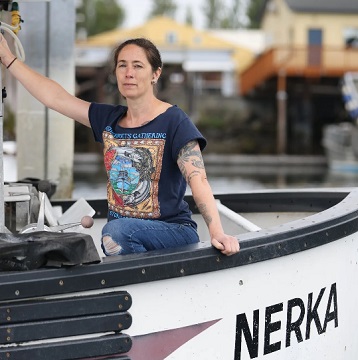
An Alaska fishery has been pitted against orcas. Can both survive?
In early May a Seattle federal judge put the brakes on this summer’s troll fishery in Southeast Alaska, ruling that the National Oceanic and Atmospheric Administration must amend its 2019 report on the impact of the fishing on endangered southern resident orcas who prefer to eat the same Chinook. But the ruling was put on hold last month by a U.S. appeals court, which allowed the fishery to reopen, citing economic harm. The complicated and contentious case probes the soft underbelly of the issue of the southern residents’ plight: the availability of nutrient-rich Chinook, their preferred meal. While fisheries up and down the West Coast are allocated fish for harvest each season, the southern residents get what’s left — and not intercepted by other predators. It has pitted fishers against orcas as some scientists and conservationists call into question the effectiveness of modern fisheries management. 9 photos, >click to read< 10:16

Corporate Welfare: Lawmakers pass controversial bill to give tax break to offshore wind developer
Lawmakers narrowly advanced fast-tracked legislation Friday that would give a Danish company a multimillion-dollar tax break for its offshore wind project, despite objections from Republicans who slammed it as “corporate welfare.” The bill would allow Ørsted, the company approved to build a 1,100-megawatt project 15 miles off the Atlantic City coastline, to keep federal tax credits that otherwise would return to ratepayers. The value of the credit would be $2.40 per year per ratepayer, by Ørsted’s estimate, but the company’s total potential savings is unclear. Critics questioned why legislators should give “a corporate bailout to a foreign company on the backs of New Jersey ratepayers,” as Assemblywoman Vicky Flynn (R-Monmouth) put it. >click to read< 09:25
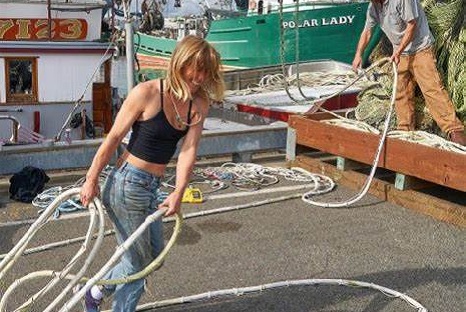
More women are casting their net into the salmon fishing industry
Breaking into a man’s industry isn’t easy, but “in large part, the industry is welcoming to women,” says Captain Allison Demmert, preparing her boat dockside at Fishermen’s Terminal. Allison is gearing up for the Alaska salmon season on the 58-foot F/V Chirikof (named for the Russian navigator who explored the Northwest coast of North America). Having captained the F/V Ultimo, moored one dock over, with four women out of a crew of five aboard, this year she will co-skipper their  purse seiner with her father Captain Guy Demmert and a crew of two men and two women. Born into an Alaskan family that has fished salmon for generations, she expanded her hands-on training with a maritime-engineering education. Mastering credentials like “advanced firefighting,” she’s in charge of “navigation, route planning and vessel maneuvering in all kinds of weather.” It’s a job that calls for “stamina, agility and above all, calm.” photos, >click to read< 14:38
purse seiner with her father Captain Guy Demmert and a crew of two men and two women. Born into an Alaskan family that has fished salmon for generations, she expanded her hands-on training with a maritime-engineering education. Mastering credentials like “advanced firefighting,” she’s in charge of “navigation, route planning and vessel maneuvering in all kinds of weather.” It’s a job that calls for “stamina, agility and above all, calm.” photos, >click to read< 14:38
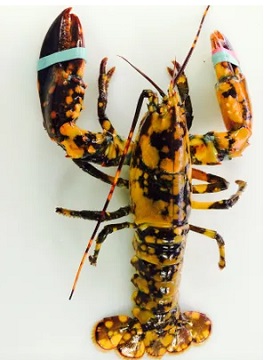
What’s behind the surge of blue, orange and calico lobsters in the Gulf of Maine?
If you have been to the Oceanarium at Hampton Beach, you know that we usually have some odd-looking lobsters. We currently have an orange, a blue, a calico, and a normal-colored lobster in our tanks. The question is always: How rare are these animals? The answer has gotten more and more murky as the years pass. The color of lobsters can be due to several things. Diet can cause them to be less vivid or more yellow from eating certain seaweeds. Shell disease can cause them to be spotted and appear to be calico. The color can also be caused by a genetic mutation, which affects the proteins in their exoskeleton. photos, >click to read< 10:53
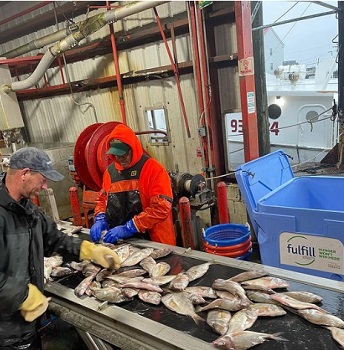
Commercial fisherman in NJ speaks out about wind turbine plan
Brick Wenzel is a commercial fisherman at the Jersey Shore. He joined me on my “Common Ground with Bill Spadea” podcast and on the broadcast this week. Brick is speaking out against the governor’s wind turbine plan, joining a chorus of opposition hoping to end the project once and for all. As I mentioned, when he appeared on the podcast he came bearing gifts! The fresh squid right off of one of his boats was a welcome treasure! As you know, Jodi got it on ice and we cooked it up the next night. Brick explained that one of the missions he’s on, in addition to commercial fishing and battling the wind project, is to provide protein to the folks who are truly food insecure. His organization is able to gather fish that has very little to no market value and deliver them to food banks across the state. Watch the podcast, key to 30:07 >click to read< 09:31






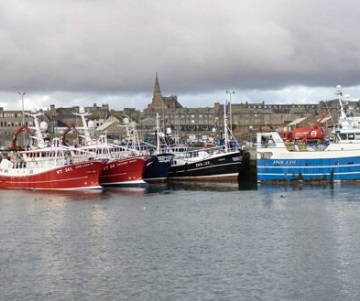
 07:51
07:51